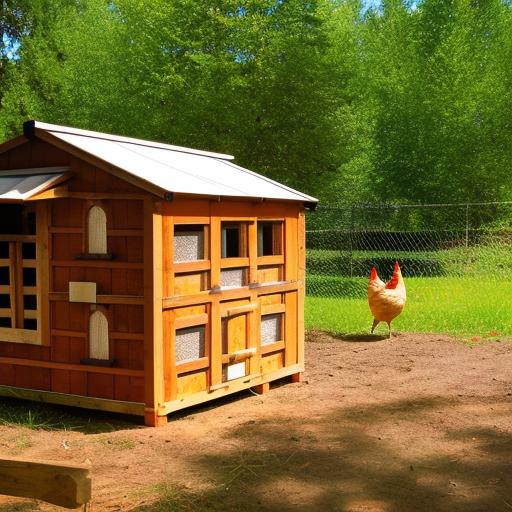Keeping chickens has become increasingly popular in recent years, as people are becoming more interested in sustainable living and having a closer connection to their food. However, not everyone is ready to commit to the time, effort, and expense of building and maintaining their own chicken coop. That’s where renting a chicken coop comes in. Renting a chicken coop is a great option for those who want to keep chickens but don’t want to commit to buying a coop.
Benefits of Renting a Chicken Coop vs. Buying Your Own
One of the main benefits of renting a chicken coop is the cost savings. Building your own coop can be expensive, especially if you want a high-quality, durable structure. By renting a coop, you can save money upfront and use those savings for other aspects of chicken keeping, such as purchasing feed or investing in additional equipment.
Another benefit of renting a chicken coop is the convenience it offers. When you rent a coop, you don’t have to worry about building or maintaining it. The rental company takes care of all the maintenance and repairs, so you can focus on enjoying your chickens without the added stress of upkeep.
Renting also offers flexibility. If you decide that keeping chickens is not for you or if your circumstances change, you can simply return the coop without any long-term commitment. This allows you to try out chicken keeping without making a permanent investment.
Factors to Consider When Choosing a Rental Chicken Coop
When choosing a rental chicken coop, there are several factors to consider to ensure that it meets your specific needs. One important factor is size. You’ll need to determine how many chickens you plan to keep and choose a coop that can comfortably accommodate them.
Location is another important consideration. You’ll want to choose a location that is convenient for you to access and maintain. Additionally, consider factors such as sunlight exposure and protection from predators when selecting a location for your rental coop.
Accessibility is also an important factor to consider. Make sure that the coop has easy access for cleaning, feeding, and collecting eggs. You’ll want to choose a coop that allows for easy maintenance and care of your chickens.
Types of Chicken Coops Available for Rent and Their Features
There are different types of chicken coops available for rent, each with its own features and benefits. One type is a mobile coop, also known as a chicken tractor. These coops are designed to be easily moved around your property, allowing your chickens to graze on fresh grass while still being protected from predators. Mobile coops are a great option if you have limited space or if you want to rotate your chickens’ grazing areas.
Another type of rental coop is a stationary coop. These coops are more permanent structures and are typically larger than mobile coops. Stationary coops offer more space for your chickens and often include features such as nesting boxes and roosting bars. They are a good option if you have a larger property or if you plan to keep a larger flock of chickens.
Understanding the Rental Agreement: What to Look For and What to Avoid
When renting a chicken coop, it’s important to carefully read and understand the rental agreement. Look for key details such as the rental period, the cost of the rental, and any maintenance responsibilities you may have. Make sure that the terms of the agreement align with your needs and expectations.
Avoid rental agreements that have hidden fees or unclear terms. It’s important to have a clear understanding of what you are responsible for and what the rental company will take care of. If there are any unclear terms or fees that you don’t understand, ask for clarification before signing the agreement.
How to Prepare Your Property for a Rental Chicken Coop
Before your rental chicken coop arrives, it’s important to prepare your property to ensure a successful rental experience. Start by choosing a level spot for the coop. A level surface will help prevent any structural issues and make it easier for your chickens to move around inside the coop.
Ensure proper drainage by choosing a location that is not prone to flooding. You’ll want to avoid areas that collect water or have poor drainage, as this can lead to health issues for your chickens.
Additionally, consider the proximity of the coop to your house and other structures on your property. You’ll want to choose a location that is convenient for you to access and maintain.
Choosing the Right Breed of Chickens for Your Rental Coop
Choosing the right breed of chickens is an important consideration when renting a coop. Different breeds have different characteristics and requirements, so it’s important to choose a breed that suits your specific situation.
Consider factors such as egg production, temperament, and climate suitability when selecting a breed. If you’re primarily interested in egg production, choose a breed known for its high egg-laying capabilities. If you have children or pets, choose a breed that is known for being friendly and docile. And if you live in an area with extreme temperatures, choose a breed that is well-suited to your climate.
Feeding and Caring for Your Chickens: Tips and Tricks
Feeding and caring for your chickens is an important part of keeping them healthy and happy. Provide them with a balanced diet that includes a mix of commercial chicken feed, fresh fruits and vegetables, and access to insects and grass.
Make sure they always have access to fresh water and clean their waterers regularly to prevent the growth of bacteria.
Provide them with a comfortable and clean living environment by regularly cleaning their coop and replacing bedding material.
Health and Safety Concerns: Preventing Common Chicken Illnesses
Keeping your chickens healthy is crucial for their well-being and productivity. There are several common health and safety concerns to be aware of when keeping chickens.
One common illness is respiratory infections. To prevent respiratory infections, make sure your coop is well-ventilated and free from drafts. Keep the coop clean and dry to prevent the growth of bacteria and mold.
Another common concern is parasites, such as mites and lice. Regularly inspect your chickens for signs of parasites and treat them promptly if necessary. Keep their coop clean and use natural remedies or approved treatments to control parasites.
Troubleshooting Common Problems with Rental Chicken Coops
While renting a chicken coop can be a convenient option, there may be some common problems that arise. One common issue is predators. Make sure your coop is secure and predator-proof to prevent any harm to your chickens. Use sturdy fencing, secure latches, and consider adding additional security measures such as motion-activated lights or alarms.
Another common problem is weather-related issues. Make sure your coop is well-insulated and protected from extreme temperatures, wind, and rain. Provide adequate ventilation to prevent moisture buildup and condensation.
Enjoying the Benefits of Renting a Chicken Coop
Renting a chicken coop is a great option for those who want to keep chickens but don’t want to commit to buying a coop. It offers cost savings, convenience, and flexibility. By carefully considering factors such as size, location, and accessibility, you can choose a rental coop that meets your specific needs.
When renting a chicken coop, it’s important to understand the rental agreement and prepare your property accordingly. Choose the right breed of chickens for your situation and provide them with proper care and nutrition. By addressing health and safety concerns and troubleshooting common problems, you can ensure a successful rental experience and enjoy the benefits of keeping chickens without the long-term commitment.
Meet Walter, the feathered-friend fanatic of Florida! Nestled in the sunshine state, Walter struts through life with his feathered companions, clucking his way to happiness. With a coop that’s fancier than a five-star hotel, he’s the Don Juan of the chicken world. When he’s not teaching his hens to do the cha-cha, you’ll find him in a heated debate with his prized rooster, Sir Clucks-a-Lot. Walter’s poultry passion is no yolk; he’s the sunny-side-up guy you never knew you needed in your flock of friends!







